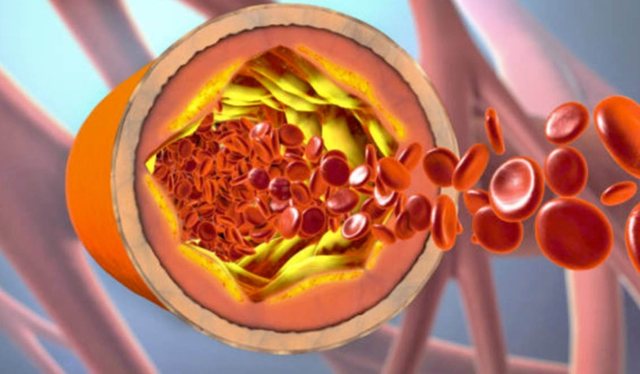
 Flash News
Flash News

Cholesterol is the topic of a flood of articles and medical advice about heart health, but experts explain that cholesterol is not necessarily bad.
First of all, humans need cholesterol.
This soft, wax-like substance is found not only in blood vessels but also in every cell.
Cholesterol is necessary for the production of hormones such as estrogen and testosterone and bile acids that help digest fats.
Furthermore, cholesterol also helps with memory and is essential for many nerve functions.
In short, if you've managed to read this far, you should thank cholesterol.
However, all jokes aside, like everything in life, even in the case of cholesterol, balances are fragile.
If your body contains high amounts of bad cholesterol, then the damage is great.
Good Cholesterol and Bad Cholesterol
Cholesterol is divided into three categories: low-density lipoprotein, very low-density lipoprotein, and very high-density lipoprotein.
High-density lipoprotein is very good for health.
Bad cholesterol does not necessarily manifest itself with specific symptoms, so it is often known as the 'silent killer.'
According to experts, a healthy cholesterol level is as follows:
Total cholesterol should be less than 200 mg/dl (milligrams per deciliter of blood)
LDL cholesterol should be less than 100 mg/dl.
LDL cholesterol should be 40 mg/dl or slightly higher.
Triglyceride levels should be lower than 150 mg/dl.
What Does Cholesterol Have to Do with the Thyroid?
The thyroid is responsible for releasing hormones that control metabolism, which directs how the body uses energy.
Thyroid hormones regulate breathing, body weight, body temperature, heart rate, and the nervous system.
What researchers didn't know until now is that thyroid problems increase bad cholesterol levels.
In some cases, the thyroid produces too much or significantly less hormones, which causes a variety of problems.
If you suffer from hypothyroidism, then the lack of hormones means more bad cholesterol in the blood.
Low hormones in the body fail to clear cholesterol from the blood, significantly increasing its levels and increasing the risk of heart disease.
Balanced Diet
People suffering from hypothyroidism cannot follow a specific dietary regimen, however, they should ensure that this regimen is balanced.
Doctors suggest that eating too much of a certain food is harmful to the body. Consequently, they suggest a rich mix of fruits and vegetables.
Foods to Avoid
Coffee and soy are two products that reduce the body's ability to utilize medications that affect hormones.
Foods like broccoli and spinach should be consumed with caution and not in excess because they are rich in iodine.
Healthy Fats
According to AgroWeb.org data, a lack of healthy fats causes hormonal imbalances.
Healthy fats are the building blocks of most hormones. They are found in avocados, olive oil, coconut oil, flaxseeds, fish, yogurt, cheese, and nuts.
Gluten
Patients suffering from hypothyroidism should avoid foods rich in gluten because they trigger the immune system to attack the thyroid.
Bread, pasta, spices, wheat and barley are some examples of gluten-rich foods that should be avoided./AgroWeb.org
Latest news


'Bankers' tax evasion, Chinese CEO and former director jailed
2025-07-05 17:39:21
Kyle Walker joins English club on two-year deal
2025-07-05 17:20:24
Two cars collide on the Saranda-Delvina axis, 4 injured
2025-07-05 17:05:29
Touching gesture! Liverpool will pay Jota's family's salary until 2027
2025-07-05 16:45:18
The zodiac signs that cheat most often
2025-07-05 16:25:53

"I asked for the dismissals", Dredha tries to soften Rama's 'blow' in Vlora
2025-07-05 15:48:49
Bomb threat in Parliament, prosecutor: It was a lie
2025-07-05 15:22:28

Bardhi: The recount revealed how greedy Zeqine Balluku is in stealing
2025-07-05 14:44:29
Knife wound on the secondary road Tirana-Durrës, perpetrator sought
2025-07-05 14:37:54
Tears and pain, Diogo Jota is escorted to his final home
2025-07-05 14:21:34
Success starts with yourself! Simple ways to invest in personal development
2025-07-05 13:58:50
Unlicensed firearms found in apartment, 50-year-old arrested in Lushnje
2025-07-05 13:43:11

Tirana Court remands Skerdi Sina to prison
2025-07-05 12:59:34
Cocaine laboratory in Greece, here are the Albanians arrested and wanted
2025-07-05 12:40:16
Directed Justice/Vangjeli: SPAK does not investigate any scandal involving Rama
2025-07-05 12:22:03

Bomb alert, Police remove MPs and media from Kosovo Parliament building
2025-07-05 11:48:16
"The will of the people" and the irony of ordered resignations
2025-07-05 11:32:05
Summer drowning risk: How to enjoy the water without risking your life
2025-07-05 11:20:27
Fire situation in the country, 16 fires reported in 24 hours, 4 still active
2025-07-05 11:07:04
Car hits pedestrian at white lines, injured in serious condition in Vlora
2025-07-05 10:59:58
Mosquito-borne diseases are a growing problem in Europe
2025-07-05 10:44:13



One of Sweden's most dangerous and wanted criminals arrested in Turkey
2025-07-05 09:38:29
Foreign exchange/ How much foreign currencies are bought and sold today
2025-07-05 09:18:38

"Don't be influenced by the opinions of others", today's horoscope
2025-07-05 08:40:50

Morning Post/ In 2 lines: What mattered yesterday in Albania
2025-07-05 08:02:07

Trump says he's ready to raise tariffs to 70% on some countries
2025-07-04 22:35:52
Tre shenjat e zodiakut që do ‘pasurohen’ në Korrik
2025-07-04 22:05:09
Gaza War: Hamas Accepts US Proposal for 60-Day Ceasefire
2025-07-04 21:50:10
Autocracy in Albania, Fuga: Governance has gotten out of control
2025-07-04 21:40:51
Meta: Agriculture on credit, the new fraud!
2025-07-04 21:26:39




Vote recount in Durrës ends without changes
2025-07-04 20:12:54
Gas station explodes in Rome, 25 injured (VIDEO)
2025-07-04 20:00:20

These afternoon habits often sabotage weight loss
2025-07-04 19:39:28
Former Arsenal player Thomas Partey accused of rape
2025-07-04 19:24:21
Shepherd disappears without a trace in Delvina
2025-07-04 19:14:31

Bardho gave Zegjine's mandate/Braho: Unfair! It violates the electoral system
2025-07-04 19:01:08


Rapid developments in the Sultanates!
2025-07-04 18:00:06



Italy tightens rules for skateboard traffic
2025-07-04 17:20:18

Unusual for the time, dense fog covers the coast of Vlora
2025-07-04 16:48:01


Accident on the Shkodra-Lezhë axis, one dead and 3 injured
2025-07-04 16:14:19
Albania with fewer requests for asylum and Albanian citizenship in 2024
2025-07-04 16:06:57

Albania last for quality of life, DP: Technical government is the solution!
2025-07-04 15:42:30
Nico Williams says "No" to Barcelona, signs with Athletic Club until 2035
2025-07-04 15:33:35
Fires in the country, four fires are still active, what is the situation?
2025-07-04 15:24:20

Summer brings big changes for these 4 zodiac signs
2025-07-04 15:00:04
Osmani: MPs need to agree to a secret ballot for the Speaker of Parliament
2025-07-04 14:51:09
Serious accident on the Peqin-Elbasan axis, two injured
2025-07-04 14:37:56

GJKKO leaves in force the security measure for the head of the KPP
2025-07-04 13:58:17
Who will replace Ilir Meta and take over the leadership of the PL?
2025-07-04 13:50:36
Berisha: Dismissal of directors in Vlora, another act of 'scapegoats'
2025-07-04 13:41:46




Librazhd/ In a serious psychological state, the young man consumes pesticides
2025-07-04 13:05:07


Weapons trafficked from Kosovo to Albania, two arrested, 8 pistols seized
2025-07-04 12:33:28
Konsumimi i tepërt i çokollatës, ja cilat janë dëmet që shkakton në organizëm
2025-07-04 12:23:35

Fires in the country, 21 fires in the last 24 hours, 4 still active
2025-07-04 12:00:19
WB calls for debt transparency: Albania to publish details of every loan
2025-07-04 11:50:05
Changes in the State Police, new names expected to lead 5 police stations
2025-07-04 11:40:06

The race for the head of the BKH, the third phase on July 11
2025-07-04 11:20:23

Toxic phrases that show your relationship is in trouble
2025-07-04 11:00:10

2 brothers arrested in Roskovec, cultivating narcotic plants
2025-07-04 10:38:08

Celebrating his 61st birthday today, Rama is surprised at the pink headquarters
2025-07-04 10:21:46
